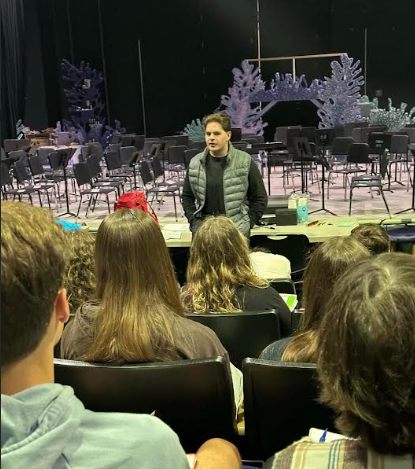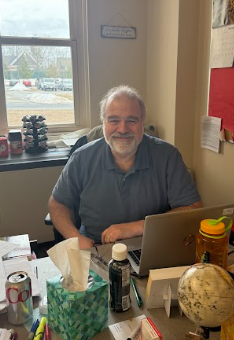Peer-to-peer interactions have made a noticeable difference within the school building, but is the Peer Mentoring program working for what Ipswich High School needs?
As of the 2023-24 school year, IHS implemented the Peer Mentoring Program. Run by an organization called Core Trainings, this program was put in place to promote leadership and create a positive environment among students. At Ipswich High School, selected juniors and seniors serve as peer mentors.
Once a month, the mentors meet with Core Trainings’ speakers to develop leadership skills and design activities to carry into their mentoring sessions with the freshmen. Core Trainings hopes to “provide an understanding of the power in Relational Leadership” and help the freshmen transition smoothly into high school. This program has sparked various positive reactions among students and administrators, however there has also been some noticeable criticism— primarily from students.
To become a peer mentor at IHS, students must fill out an application and write a brief explanation as to why they wanted to be a mentor. When asked why she wanted to be a mentor, senior Frances Hertz, a mentor since the program began who was selected as one of the students on the executive board for the 2024-25 school year said, “I saw it as a good opportunity to try and help bridge the gap between the grades at Ipswich.” She also wanted to help underclassmen “manage new social and educational situations.”
From the mentor’s perspective, challenges have been most prominent with freshmen students during many of the sessions. Frances worked alongside other mentors in one freshman advisory where she noticed that “students were hesitant to participate,” and “reluctance mainly came in the form of not speaking or not taking part in activities.” At length, mentors are unable to fulfill their positions without proper participation from freshmen students.
Sophomore Aurelia Teheen, who participated in peer mentoring her freshman year concluded, “students were more reluctant to the activities because they wanted to spend the time doing their homework” and when asked to elaborate on her own opinion, she shared that she, too, “felt reluctant most of the time because [she] usually needed the time for [her] school work.” Commonly, students who needed to complete work felt that the mentoring sessions took time away from their free periods.
Despite these downsides, the program has proven to be impactful to the student body here at IHS. English Teacher David Wood, an English teacher, freshman advisory teacher, and observer of mentoring sessions, believes it is a “smart idea to put outstanding students in front of young students as examples of what they can aspire to be in a few years.” While a lack of staff intervention may seem to be a weakness in the program, it has actually given leaders a chance to thrive. The program has created a healthier environment within the school characterized by greater camaraderie, positive interactions between students, and younger students seeming “more confident and more apt to speak up and ask questions,” according to Wood.
The implementation of the Peer Mentoring program at IHS definitely isn’t perfect, but it is still in its early stages. For older students, it opens up a resume title, and new connections within the school. Hertz says, “This program has improved my leadership skills and pushed me out of my comfort zone.” The program gives upperclassmen a leadership opportunity and provides younger students with role models. Ultimately, peer mentoring may be crucial to the culture of our school. According to Wood, the program “builds community in the school” where younger students can feel more comfortable around older ones.
The scripted program is a good start to building relationships between students. However, it should be further enhanced by personalizing sessions to better align with our school’s environment. If Ipswich High School can overcome the downsides of this program, it could completely change the culture of interactions between students inside and out of the classroom. IHS mentors can capitalize on the need for improvement by tailoring the program to the needs of our school through mentor improvisation and by designing new activities specific to our school’s monthly happenings.



